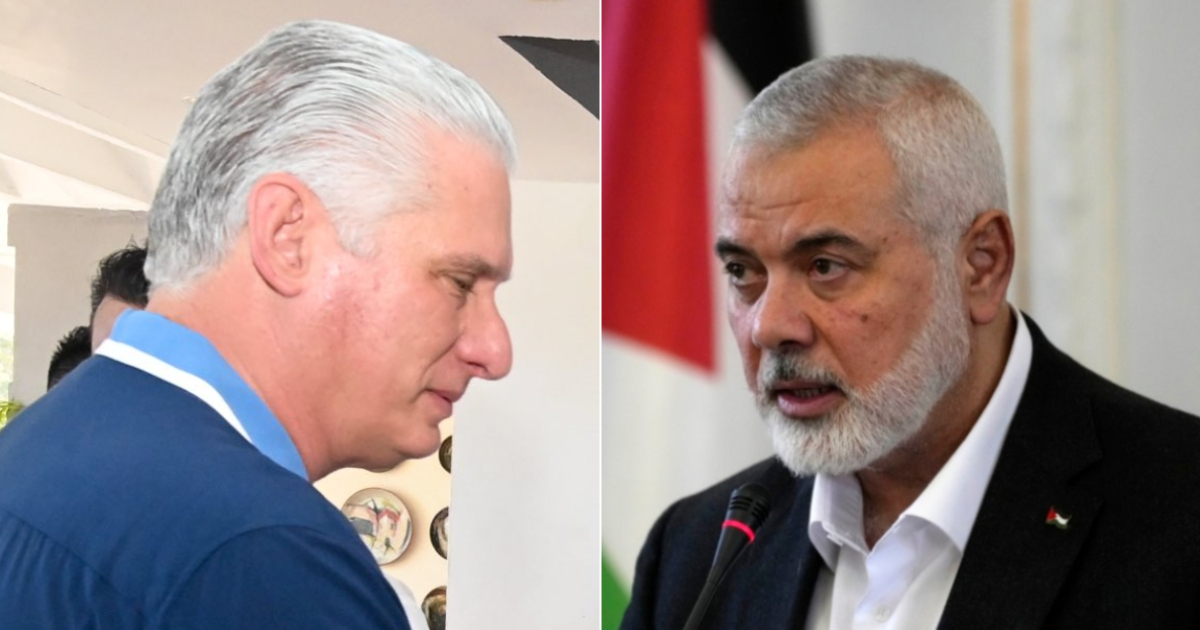Cuban leader Miguel Díaz-Canel expressed his condolences on Wednesday for the death of Ismail Haniyeh, the leader of Hamas, who was killed during an attack in Tehran. Haniyeh had traveled to Iran to attend the inauguration of the new Iranian president, Masoud Pezeshkian.
"Cuba strongly condemns the assassination of Ismail Haniyeh in Tehran, a blatant violation of International Law that further endangers the situation in the Middle East, global peace, and security. Our heartfelt condolences to the brotherly Palestinian people, his family, and close ones," stated Díaz-Canel, who also serves as the First Secretary of the Communist Party of Cuba.
Prime Minister Manuel Marrero Cruz, who also attended Pezeshkian's inauguration in Iran, condemned the attack on social media. "From Iran, we strongly denounce the assassination of Palestinian leader Ismail Haniyeh in Tehran, a flagrant violation of Iranian sovereignty. This act threatens international peace and security. We express our deepest sympathies to the brotherly Palestinian people," Marrero Cruz said.
A mere week after the massacre of over 1,200 Israelis by Hamas terrorists on October 7, 2023, an operation that also saw over 250 civilians kidnapped, Díaz-Canel accused the Israeli government of being solely responsible for the ensuing conflict. "We reiterate our deep concern over the escalation of violence between Israel and Palestine, a consequence of decades of illegal Israeli occupation and colonization practices, in flagrant violation of the inalienable rights of the Palestinian people," Díaz-Canel tweeted.
Cuba’s Position on the Israeli-Palestinian Conflict
The Cuban regime has consistently aligned itself with its allies, Russia and Iran, forming a coalition in support of Hamas under the guise of anti-imperialist and humanitarian concerns. Ten days after the conflict erupted, Díaz-Canel blamed Israel for the bombing of the Al Ahli Hospital in Gaza, which resulted in hundreds of deaths and injuries. Although initial reports attributed the massacre to an Israeli missile, later investigations suggested possible Hamas responsibility.
Nevertheless, the Cuban leader stated, "We vehemently condemn the bombing by Israel of the Al Ahli Hospital in Gaza, which has caused hundreds of deaths and injuries. We demand an immediate ceasefire and an end to these flagrant violations of International Humanitarian Law."
The historical ties between the Cuban dictatorship and the "cause of the Palestinian people" trace back to the friendship between Fidel Castro and Yasir Arafat. The Cuban regime has used this issue for propaganda purposes, emphasizing its alignment with interests opposed to the United States (and by extension, Israel).
"Let's make this song for life go viral," Díaz-Canel urged from his social media account on October 17, 2023, sharing a music video by the Al Mayadeen television network featuring the song "Somos Palestina" by Puerto Rican artist Danny Rivera.
The ruler's wife, Lis Cuesta Peraza, has also lamented the situation of Palestinians in the Gaza Strip on social media. "The humanitarian situation is extremely catastrophic and unsustainable, and the siege, especially in Gaza and the northern governorates, almost deprives more than a million people of a glass of water or a piece of bread," said the first lady in late October 2023.
Days later, her husband commented, "The Palestinian people are living through a horror today. The images of the holocaust perpetrated by Israel are horrific," and questioned, "How long will we witness the suffering of so many children? Those opposed to ending the violence will have to bear the responsibility for so many deaths."
A month and a half after Hamas's brutal and bloody incursion into Israeli territory, Díaz-Canel illuminated the Plaza de la Revolución with the Palestinian flag and hosted over 100 young Palestinians studying medicine in Cuba.
In late November last year, Díaz-Canel, his wife, and the prime minister led a march in Havana for Palestine, alongside other leaders. The Cuban government elite was seen wearing white and black Palestinian keffiyehs and surrounded by numerous bodyguards at the propaganda event.
Questions on Cuba’s Stance and Actions in the Middle East Conflict
Here are some frequently asked questions regarding Cuba’s involvement and position in the ongoing Middle East conflict, based on the recent statements and actions by the Cuban government.
Why did Díaz-Canel send condolences for the death of Ismail Haniyeh?
Díaz-Canel sent condolences for Ismail Haniyeh's death as a gesture of solidarity with the Palestinian people and to condemn what he views as a violation of International Law by the perpetrators of the assassination.
How does the Cuban government view the Israeli-Palestinian conflict?
The Cuban government views the Israeli-Palestinian conflict as a result of decades of illegal occupation and colonization practices by Israel, and it consistently sides with Palestine, aligning with allies like Russia and Iran.
What are the historical ties between Cuba and Palestine?
The historical ties between Cuba and Palestine date back to the friendship between Fidel Castro and Yasir Arafat. The Cuban regime has leveraged this relationship for propaganda purposes, emphasizing its opposition to U.S. and Israeli interests.
What actions did Díaz-Canel take to show support for Palestine recently?
Recently, Díaz-Canel illuminated the Plaza de la Revolución with the Palestinian flag, hosted young Palestinians studying medicine in Cuba, and led a march in Havana for Palestine.
